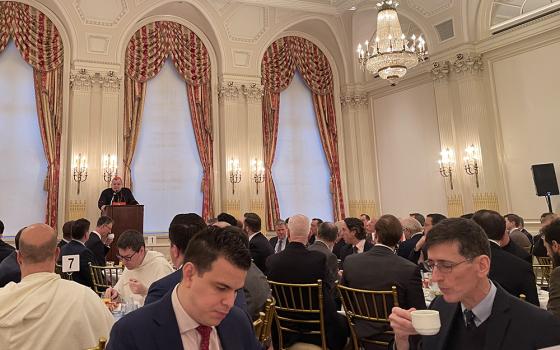A headline on the Internet this morning summed up Francis' visit to Brazil: "Pope Hints at Major Reversal."
It referred to Pope Francis' welcome of gay priests, vowing not to judge them but rather to "forgive" them of their sins.
The headline's implication was that a "reversal" in fundamental teachings about homosexuality was in store.
Is that what the pope wanted? A more open acceptance of gay priests who stay within the existing rules? And to hint an overturn of Pope John Paul II's 1987 verdict that being homosexual was essentially a "disordered" state of being?
If he didn't mean to suggest a new Catholic teaching on homosexuality, should he have plainly said so? Would that have been in keeping with his image in some quarters as being bluntly honest? Or does he believe that a little dose of mixed signals is justified in order to ease the bitterness that has been swirling around the issue?
Is the media just grasping at straws or is there a degree of willful deception in a larger plan to give the church an upbeat, loving face?
It's too early in the papacy to know for sure, but worth noting perhaps that the same patina of double speak characterizes the major issues Francis addresses. Is he the "repair the crisis" pope who sees his mission as reviving church spirits before unloading some concrete, contentious re-designs, or a public relations pope whose effort is to recast the profile of Catholicism without following through on vague suggestions that things will substantially change?
So much of what he says has an appealing ring so long as it's not examined too closely. You can see millions of heads nodding, for example, when he declares in all sincerity that bishops must be "men who love poverty, both internal poverty ... and external poverty, as simplicity and austerity of life." But how can a bishop, in fact, know physical poverty when he never finds himself without food, clothing shelter, choosing to live "simply" as a luxury of affluence? Better simplicity than ostentation, that's for sure, but the parallel is illusory. Using the words, however, invites all sorts of interpretations that suggest far more than the words imply.
Same with encouraging young people to "change" and "rebuild the Catholic church." By overlooking all the teachings that irritate them or campaigning for a revision of the church's sexual ethics? Being willing to take doctrine as they are while proselytizing -- or proselytizing for a reformed church? Fill in the blank.
At another point during his hugely successful visit, he visited the slums and left the impression among many in the media that his devotion to the cause of eradicating poverty were his roots in liberation theology. So did he mean to do that as a subtle way of making amends with a once vibrant movement of reform that he rejected or indicating his determination to unveil a new strategy for aiding the most desperately needy among us? Or neither. Are we supposed to be guessing or is it all good will and window dressing?
A lot of what the appealing and intriguing pope said could be seen as a plea to keep young people -- any Catholics -- from crossing the street to the Pentecostal churches known for their warm embrace, empowering of lay people and live-wire worship. While genuine ecumenism is out of fashion and was nowhere to be seen, neither did the pope directly bash the Pentecostal rivals. But the signs of distress over massive defections could be heard in his urgent appeals to wavering Catholics to "stay home." On that there was no ambiguity.




